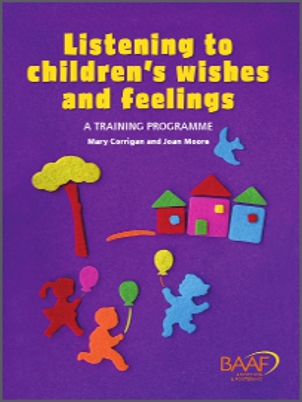
Listening to children's wishes and feelings - a training programme
£25.00
When making decisions about children's futures and planning for children's services, it is vital to listen to children’s views, wishes and feelings. Feeling understood and having their views taken seriously is particularly important for children who have experienced loss and transition, and can help to build identity and resilience.
The Listening to children’s wishes and feelings training course will equip participants with a range of techniques for effective listening to and communication with children. It enables workers and carers to help children to process difficult experiences; use reflective listening skills and assessment techniques; assist children in processing and recording their life history; and support them through moves and transitions.
This resource, designed to be undertaken over four days or four sessions, can be delivered as a whole or in modular form. It consists of a training programme, complete with CD-ROM of PowerPoint presentations and handouts, and a course handbook for participants, which comes with a Techniques CD-ROM containing over 80 strategies, activities and techniques that can be used in direct work.
This is an invaluable resource for social workers, adoptive parents and foster carers, and all those who are doing direct work with children to help them feel heard and to build resilience and identity.
HARD COPY
Reviews
I am delighted to recommend this course. Its publication is timely and its content is excellent.
Margaret Adcock
Having delivered the course to social workers, I found it was a clearly set-out programme which incorporates theory and practice well…The participants particularly likes the highly experiential nature of the training and that they left the course with many new tools they could incorporate straight away into their practice…The authors are both very knowledgeable and experienced practitioners and this is reflected throughout the books. I recommend the course to therapists who are trainers and therapists who work with children in local authority care.
Carol Platteuw, play therapist and independent social worker, Seen and Heard
